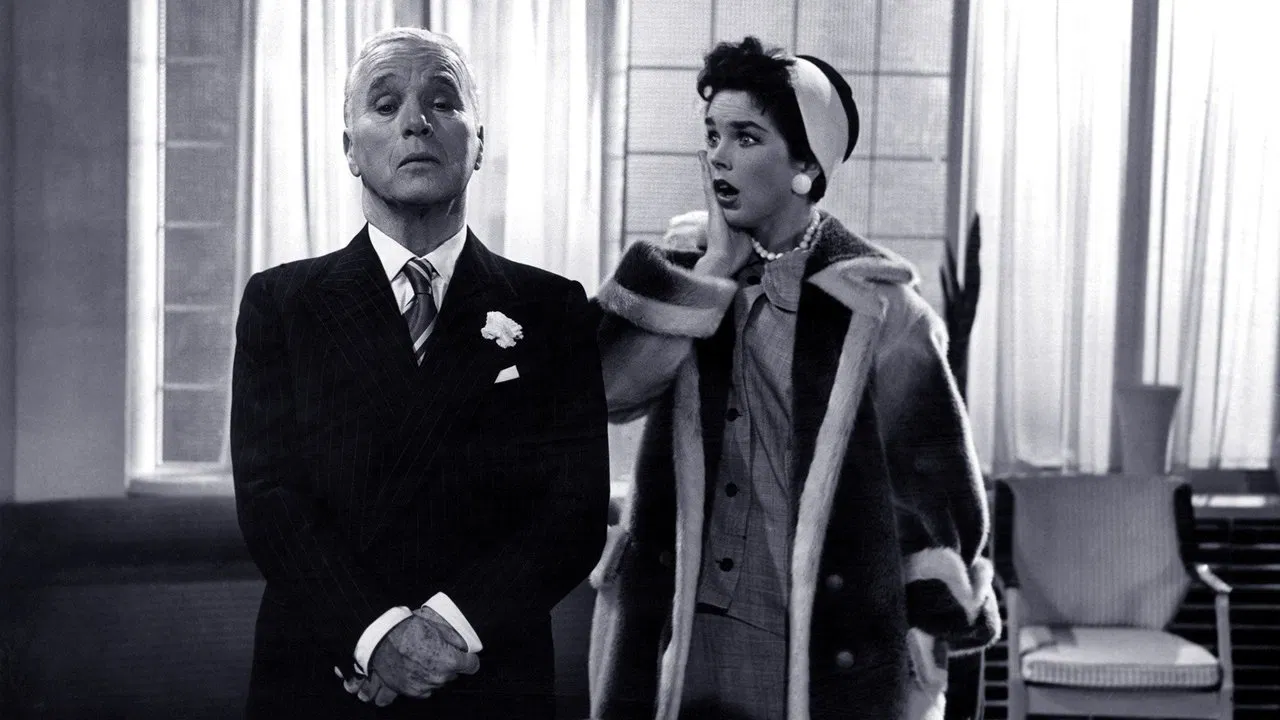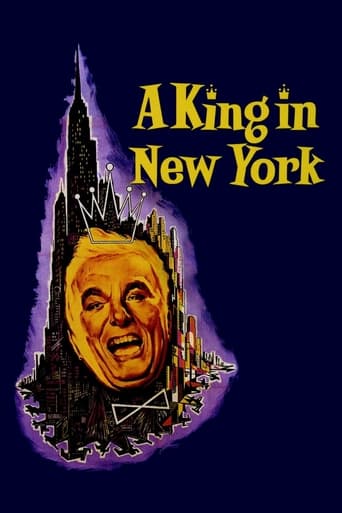

It's a mild crowd pleaser for people who are exhausted by blockbusters.
... View MoreThe tone of this movie is interesting -- the stakes are both dramatic and high, but it's balanced with a lot of fun, tongue and cheek dialogue.
... View MoreWhile it doesn't offer any answers, it both thrills and makes you think.
... View MoreIt's a movie as timely as it is provocative and amazingly, for much of its running time, it is weirdly funny.
... View MoreHaving gotten barred from reentering the US in 1952, Charlie Chaplin moved to Europe, where he spent the rest of his life (returning to the US only in 1972 when the Academy Awards gave him an honorary Oscar). His final starring role was "A King in New York", which appears to be based on his personal experiences. He plays a monarch who flees a revolution in a fictional country, moving to the Big Apple where he accidentally becomes a TV star. But he gets stigmatized after befriending the son of communists. The highlight is when he turns the HUAC hearings into a water park.As can be expected, the movie didn't get released in the US for a few years. It's amazing that there are still idiots who think that HUAC was a noble cause (but what do you expect from a bunch of morons who get all their "information" from Rush Limbaugh and Fox Noise?). Anyway, CC's final starring role is a really great one. He directed one final movie, "A Countess from Hong Kong" starring Marlon Brando and Sophia Loren (it was an OK movie).
... View MoreAs probably one of Chaplin's lesser efforts, this falls short of the level of sheer genius to the level of mere mortal excellence.As proof of Americans' depressing ability to laugh at any ethnic group or nationality except for themselves, at the time, this movie got many Americans' hackles up, and by the looks of the comments here, still does for some people. However, Chaplin's tone in this film, described by some as bitterness, I would more accurately call incisiveness.Of course this movie had to be made in Britain, and wasn't shown in the USA for about 20 years, until after the youthquake of the late 1960's and the changing of the generational guard, proving Americans are not fond of having their foibles and hypocrisies pointed out to them in a rather obvious manner.Some of the more satirical aspects of the film, including the film trailers, TV advertising, the reality television show (Chaplin about 40 years ahead of the curve on that one) and the whirlwind feel of New York City, represent rather gentle pokes at a society in which, to remind everyone, Chaplin had worked in and made his fame and fortune in for over 40 years.It's only when the Senator McCarthy inspired storyline takes hold, around halfway through the film, that the story turns markedly more serious. Chaplin sprinkles the film throughout with references to the US Constitution, and freedom of speech, and "American blood boiling." Clearly he is on the side of freedom versus totalitarianism, and against the witch hunt like tactics of HUAC that destroyed American careers, drove people into poverty or exile, and provably never found one person that was a real, imminent danger to American society. Looking back from this point, almost everyone agrees that HUAC and its blowback were a blot on the history of the United States and its aspirations of freedom, and rightfully so.Although this aspect of the film is a bit heavy-handed, and the rather sad ending is somewhat disappointing but rather realistic within the context of the times, I feel that this only detracts mildly from the comedy on offer, Chaplin's amazing screen presence, and artistry as a writer, actor and director. It is enough to make me wish he had done more than three talking films in his career. Yes, that guy in his 60's up there on the screen with the gray hair certainly isn't the little tramp of 1920, but he is a character almost equally as compelling, and much more formidable.Not mentioned by many is the fact that Chaplin even composed the score for this film, which is in itself worthy of praise. Chaplin probably could have carved out a career as a successful film composer, over and above his other gargantuan talents.See it if you can. A King in New York is a treasure.
... View MoreI watched a lot of early Charlie Chaplin films and can only say that like Red Skelton, to me they were neither funny nor what I would classify as great. For me, the ones from that era that were funny were Oliver & Hardy, or later on Abbot & Costello. I loved this film but watched without even knowing it was a Charlie Chaplin movie when I first saw it. As proof that Charlie was correct in his assessment of the American lunacies and a denunciation of McCarthyism is the fact that the movie wasn't released in the US until the 1970s and probably wasn't viewed except by only a few Americans until the 1980s. I think the reason some people don't like it is because they want the Charlie Chaplin of the old silent film era. I would say they are not even the same person. After being hounded out of the United States and being told he would not be allowed to return, how do you expect him to feel? He had to become an almost totally different person after that kind of experience. The penultimate moment of the film for me is when he is labeled as being a Royal Communist. That has to be the most absurdly funny statement I have heard for a long time. His answer in a Latin sounding phrase made it even more humorous. I rate it right up there with Abbot & Costello's "Who is on first, What is on second, I don't know is on third ..." The ensuing actions of what starts it all hinges on those moments. Is it really possible to have a Royal Communist? If you like Oliver & Hardy, Abbot & Costello, or the Marx brothers you will like this movie.
... View MoreFor years I've read how controversial and second-rate this film is. I finally bought the MK2 DVD, and was amazed at how funny and intelligent Chaplin's movie really is. I can understand the controversial aspect - it's not very subtle although it's entirely correct - but second rate?? I also hear how supposedly 'shabby' the movie appears, due to a tight budget and shooting schedule, but I honestly don't see any of these flaws. In fact, "A King In New York" may be my favorite Chaplin picture. The only problem I have with the entire film is the comedians scene in the club. Every single person in attendance is laughing hysterically at two quite unfunny performers. It's actually so slow and stupidly surreal it takes away from the commentary that runs throughout the movie. Oh well, a minor quibble but, still. If you're avoiding "A King In New York" for any reason, go get it. You'll be very pleased with this classic.
... View More